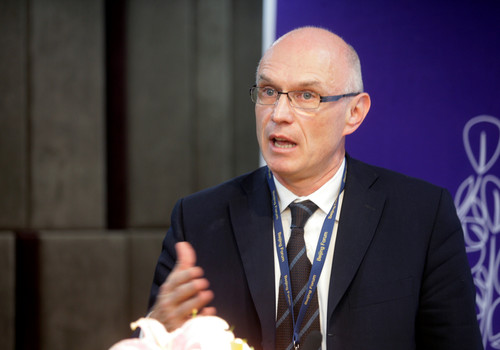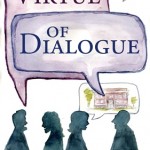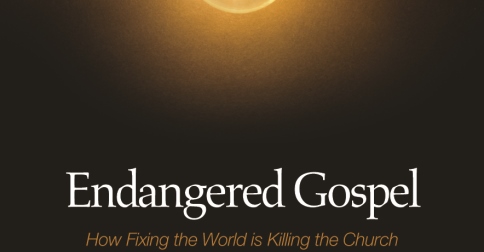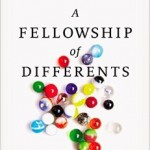 Chris and I recently collaborated on an article about the political role of the local church for the upcoming February/March issue of Neue Magazine. In preparation for writing the article, I had the opportunity to interview Dr. Miroslav Volf about politics, the local church, promoting human flourishing, and his most recent book, A Public Faith: How Followers of Christ Should Serve the Common Good. Dr. Volf is the Henry B. Wright Professor of Systematic Theology at Yale Divinity School and the Founding Director of the Yale Center for Faith & Culture. He is the author of numerous books, including Allah: A Christian Response (2011) and After Our Likeness: The Church as the Image of the Trinity (1998). His book Exclusion and Embrace: A Theological Exploration of Identity, Otherness, and Reconciliation (1996) is a classic work. It won the prestigious University of Louisville Grawemeyer Award. It was also included, less prestigiously, in Besides the Bible as one of the 100 books every Christian should read.
Chris and I recently collaborated on an article about the political role of the local church for the upcoming February/March issue of Neue Magazine. In preparation for writing the article, I had the opportunity to interview Dr. Miroslav Volf about politics, the local church, promoting human flourishing, and his most recent book, A Public Faith: How Followers of Christ Should Serve the Common Good. Dr. Volf is the Henry B. Wright Professor of Systematic Theology at Yale Divinity School and the Founding Director of the Yale Center for Faith & Culture. He is the author of numerous books, including Allah: A Christian Response (2011) and After Our Likeness: The Church as the Image of the Trinity (1998). His book Exclusion and Embrace: A Theological Exploration of Identity, Otherness, and Reconciliation (1996) is a classic work. It won the prestigious University of Louisville Grawemeyer Award. It was also included, less prestigiously, in Besides the Bible as one of the 100 books every Christian should read.
The Neue article should be on newsstands any day. In the meantime, here is a transcript of my interview with Dr. Volf.
How did this new book, A Public Faith, come about? Did it arise out of a single original moment?
The book has been a long time in gestation. Indeed, the individual pieces, though written with the unity in mind, have been written across a relatively wide swath of time – some 15 years if I recall correctly, and one even older than that. I have been thinking about these issues for quite some time. A Public Faith was the result.
Were you writing primarily for a Christian audience?
I think the book is primarily for a Christian audience. What I hope is that folks of other religions, as well secularists, will look over the Christian’s shoulders – to be informed about how Christians should think about their faith in the public realm, to deal with their fears of Christian usurpation of public space, and, in a sense, to offer a proposal to others (Muslims, in particular, but also Hindus and others) of what a religiously pluralistic public space might look like.
Some of your earlier work was on the topic of forgiveness. Do you perceive a continuity between that earlier work and A Public Faith?
Some of my earlier work was on the relationship between ethnic groups and how a self formed by a particular ethnicity relates to others in the context of conflict. I think that still very much applies, that same spirit permeates A Public Faith. But A Public Faith is about how one constructs the public space in which one can carry on and bring to bear one’s faith on issues. Certainly one way in which we bring our faith to issues is to elevate the idea of forgiveness, the idea of embrace, and to debate issues of exclusion – all of these are substantive issues of the Christian faith. Primarily in terms of moral life, A Public Faith describes a kind of forum, the kinds of arrangements, and the kinds of relationships of faith to the world that make it possible to bring the Christian faith to bear on public matters.
You propose an alternative both to people espousing the view that religion has no place in the public sphere, and an alternative to the total saturation of one religion in public life. You describe your position as “religious political pluralism.” What is religious political pluralism?
A very simple way to describe it is to say that every person and all religious groups should participate in the public life on equal terms and out of the specific wisdom and character of their own religious traditions. It’s governed by the Golden Rule principle applied to public life: what you wish others to do to you do unto them as well. I wish others to provide space for me to speak out of my own faith convictions in the public realm; I have an obligation to grant the same thing to them.
What happens when religion – whether it is pushed out or goes voluntarily – leaves the public sphere?
Well, different things happen whether it is pushed out or whether it leaves voluntarily. When it is pushed out, I think it leads a sort of subterranean existence. It often becomes insular, often becomes unaware of what bearing religious thoughts have on public life because they are not tested in the public realm. That is to the detriment of positions of Christians themselves.
If faith retreats from the public realms – and in some areas it has to retreat because the conditions are not there, and some accounts of the Christian faith are such that Christians are not encouraged to take responsibility – I think this is a kind of diminution of the Christian faith. Sometimes it is an understandable diminution of the role of faith but it is a diminution nonetheless, because God is the God of all of reality, of all aspects of life. Our faith has bearing on all aspects of life. When faith is pushed out or retreats from the public sphere, it idles. That is especially true of the prophetic faiths. Christianity is a prophetic faith.
A Public Faith is about how the Christian faith works toward what you call “human flourishing.” Christian faith works on its own toward this end and, in a pluralist context, it works with other religions. Describe what you mean by human flourishing.
Each of the faiths will have their specific account or accounts of human flourishing. I think in the Christian faith, human flourishing is life in which one receives oneself from God as a beloved child of God, and loves God and loves neighbor.
That’s a very rough definition of what it means to flourish as a human being. But I think it also has two significant components: The first component being that one leads one’s life well. The other component being that life goes well for one. So it has both active and passion dimensions to it. Health of the body might be a passive dimension of flourishing; aspects of moral responsibility are an active dimension.
When I say religions can together promote human flourishing, they do this through healthy debate about accounts of human flourishing. There are distinctions and differences between faiths on that very issue. I think such debates are very important, rather than us all operating with some kind of a default account of human flourishing that isn’t tested by other religions and by secular accounts of human flourishing as well.
There were a couple different places in the book where you advocate a third way – that’s my language – that doesn’t try to stake a middle ground between poles, but somehow transcends the traditional choices we are often given. One such area is the way different religions relate to one another in the public sphere. Our traditional choices have been to (a) say that all religions have a common core, or (b) emphasize the differences between the religions. You describe both of these options as “wrongheaded.” Why are they wrongheaded, and what is the alternative?
The first is wrongheaded because I do not believe that all religions at their heart are the same, or that they are just varieties of husks or containers passing on what is essentially the same content. I think religions, among other things, give account of the self – who the self is, what human relationships should look like, and what the good is – within their overarching interpretation of the world. They make truth claims, and their truth claims sometimes are in contrast. The truth claims of one religion compete with the truth claims of the other religion.
Why one ought not simply [emphasize] the differences between religions is, for me, very simple: one doesn’t define anything by pointing only to its differences, but to its commonalities as well. I think it’s important for us to be mindful of the differences while also building on commonalities. That seems to me to be an expression of truthfulness, which is attuned to the concrete forms of different religions and seeks to ask, “What are the differences?” and also “Where are the overlaps?”
I think overlaps are important, especially if we live in a pluralistic world and if we affirm democratic values. I affirm democratic values on Christian grounds. I don’t think it is the only political arrangement that is appropriate in the context of Christian faith, but you can defend it plausibly on Christian grounds. If you do, you have to live under the same roof with other folks. Commonalities are essential for living together. As it turns out, the commonalities don’t need to be invented. They are in fact there.
I grew up in a religious and political environment where we were taught to think in terms of “Us vs. Them.” But you talk in A Public Faith about “negotiating disagreement and conflict in mutual respect.” Do you think this respectful negotiation is really possible?
If one looks at the North American scene today, particularly the United States, one might think that it isn’t possible. I’m hopeful – and that is in many ways the thrust of the book – that we can both affirm our own distinct characteristics and look for commonalities, while respecting other people.
1st Peter 2:17 says “Respect everyone.” Everyone. That is a universal demand for respect, meaning also those who differ from you. This is a fundamental moral conviction of the Christian faith: every person, on account of being created in God’s image, deserves respect, even those with whom we profoundly disagree.
The principals you describe in A Public Faith do seem applicable to domestic American politics, which, while not likely to end in full-scale violence, are still fraught with meanness, fear, and distrust.
I think they are applicable. I think we are witnessing a kind of spirit of meanness, as you put it, a win-at-all-costs attitude that is poisoning the political atmosphere, making debate on central issues that move and are important in people’s lives, very difficult if not impossible. I think for the sake of truth-seeking debate – for the sake, if you want, of the proper conduct of political conflict – we need respect of other people, including people of other religions.
Here too I would say we need to steer away from a false harmony where conflict in the public realm is deemed, to start with, unacceptable, so that one functions with some kind of account of social relationships that are, from the start, harmonious. They will be, we hope, in the world to come. But social relationships are conflict-ridden.
One extreme is this presumption of harmoniousness, the other is the conduct of culture wars. We need something between those two. And what we need is for public conflicts and arguments to be carried on in respect.
We are entering a presidential election year, when politics seem to be in the very atmosphere. What kinds of conversations should pastors and other church leaders be having with their congregations during this time, especially around the idea of working with others – other religions, people with different political views – toward the common good? Put simply, what advice on this topic do you have for church leaders?
While being mindful and holding on to specific differences, don’t forget to seek the common ground. You don’t betray your faith by seeking common ground. The more you can genuinely, truthfully agree with another person the better on the whole things are. You are not a winner by being different. You are a winner by following where the truth leads, whether that is difference or commonality.
The other [message for church leaders] would be to learn how to disagree in respect, to listen to the argument, to learn from the argument, and to present one’s position in a way that takes into account people’s aspirations, hopes, and fears.
You’re making it clear that seeking common ground is not the same as compromise.
The two are very distinct.
Seeking common ground is an expression of truth-seeking. Some people have the attitude that to be different is somehow value – in the sense of, “I enhance the character of my own faith the more different it is from all other faiths.” This attitude amounts to difference for difference’s sake. I value differences, but I simply say that I am interested in the truth. If the truth of my faith overlaps with the truths of other faiths, so much the better. This approach is informed, if you want, by the spiritual conviction that we ought to rejoice in the truth, wherever truth is found.
I don’t think there is much space for compromise in strictly the issues of faith. There is compromise at the political level, there is compromise in business negotiations, there is compromise in all sorts of areas of life. But it’s not like you can create an amalgam of faiths by conducting ecumenical negotiations and figuring out comprise positions. That would be a worst possible ecumenism and disrespectful to the faiths themselves.











